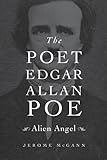The Poet Edgar Allan Poe : Alien Angel / Jerome McGann.
Material type: TextPublisher: Cambridge, MA : Harvard University Press, [2014]Copyright date: ©2014Description: 1 online resource (208 p.)Content type:
TextPublisher: Cambridge, MA : Harvard University Press, [2014]Copyright date: ©2014Description: 1 online resource (208 p.)Content type: - 9780674416666
- 9780674735972
- 818.309
- online - DeGruyter
- Issued also in print.
| Item type | Current library | Call number | URL | Status | Notes | Barcode | |
|---|---|---|---|---|---|---|---|
 eBook
eBook
|
Biblioteca "Angelicum" Pont. Univ. S.Tommaso d'Aquino Nuvola online | online - DeGruyter (Browse shelf(Opens below)) | Online access | Not for loan (Accesso limitato) | Accesso per gli utenti autorizzati / Access for authorized users | (dgr)9780674735972 |
Browsing Biblioteca "Angelicum" Pont. Univ. S.Tommaso d'Aquino shelves, Shelving location: Nuvola online Close shelf browser (Hides shelf browser)

|

|

|

|

|

|

|
||
| online - DeGruyter Cold War Crucible : The Korean Conflict and the Postwar World / | online - DeGruyter The Romani Gypsies / | online - DeGruyter The Expressive Powers of Law : Theories and Limits / | online - DeGruyter The Poet Edgar Allan Poe : Alien Angel / | online - DeGruyter Taming Manhattan : Environmental Battles in the Antebellum City / | online - DeGruyter Minds Online : Teaching Effectively with Technology / | online - DeGruyter Islam and Nazi Germany's War / |
Frontmatter -- Contents -- Abbreviations -- Introduction -- 1. Poe In Propria Persona -- 2. Poetics and Echopoetics -- 3. Poetry: or Masks for a Read Death -- 4. The Politics of a Poetry without Politics -- Coda -- Notes -- Index
restricted access online access with authorization star
http://purl.org/coar/access_right/c_16ec
The poetry of Edgar Allan Poe has had a rough ride in America, as Emerson's sneering quip about "The Jingle Man" testifies. That these poems have never lacked a popular audience has been a persistent annoyance in academic and literary circles; that they attracted the admiration of innovative poetic masters in Europe and especially France-notably Baudelaire, Mallarmé, and Valéry-has been further cause for embarrassment. Jerome McGann offers a bold reassessment of Poe's achievement, arguing that he belongs with Whitman and Dickinson as a foundational American poet and cultural presence. Not all American commentators have agreed with Emerson's dim view of Poe's verse. For McGann, a notable exception is William Carlos Williams, who said that the American poetic imagination made its first appearance in Poe's work. The Poet Edgar Allan Poe explains what Williams and European admirers saw in Poe, how they understood his poetics, and why his poetry had such a decisive influence on Modern and Post-Modern art and writing. McGann contends that Poe was the first poet to demonstrate how the creative imagination could escape its inheritance of Romantic attitudes and conventions, and why an escape was desirable. The ethical and political significance of Poe's work follows from what the poet takes as his great subject: the reader. The Poet Edgar Allan Poe takes its own readers on a spirited tour through a wide range of Poe's verse as well as the critical and theoretical writings in which he laid out his arresting ideas about poetry and poetics.
Issued also in print.
Mode of access: Internet via World Wide Web.
In English.
Description based on online resource; title from PDF title page (publisher's Web site, viewed 30. Aug 2021)


